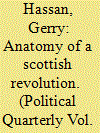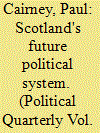| Srl | Item |
| 1 |
ID:
107203


|
|
|
|
|
| Publication |
2011.
|
| Summary/Abstract |
Scottish politics isn't about some remote northern politics but go to the heart of the nature, character and power dimensions of the UK and British state. Scotland has been dramatically changed by the scale of the SNP landslide victory in the 2011 Scottish Parliament elections. Scottish society, identity and culture along with the politics of unionism and nationalism have all changed and will change further. The old fashioned politics of devolution are dead, but what comes next and what are the consequences for Scottish independence? What has to be challenged are old-fashioned out-of-date views of the SNP, and the unreconstructed nationalism of the British state.
|
|
|
|
|
|
|
|
|
|
|
|
|
|
|
|
| 2 |
ID:
138878


|
|
|
|
|
| Summary/Abstract |
Debates on Scottish constitutional reform go hand in hand with discussions of political reform. Its reformers use the image of ‘old Westminster’ to describe ‘control freakery’ within government and an adversarial political system. Many thought that the Scottish political system could diverge from the UK, to strengthen the parliamentary system, introduce consensus politics and further Scotland's alleged social and democratic tradition. Yet the experience of devolution suggests that Holyrood and Westminster politics share key features. Both systems are driven by government, making policy in ‘communities’ involving interest groups and governing bodies, with parliaments performing a limited role and public participation limited largely to elections. The Scottish government's style of policy-making is distinctive, but new reforms are in their infancy and their effects have not been examined in depth. In this context, the article identifies Scotland's ability to make and implement policy in a new way, based on its current trajectory rather than the hopes of reformers.
|
|
|
|
|
|
|
|
|
|
|
|
|
|
|
|